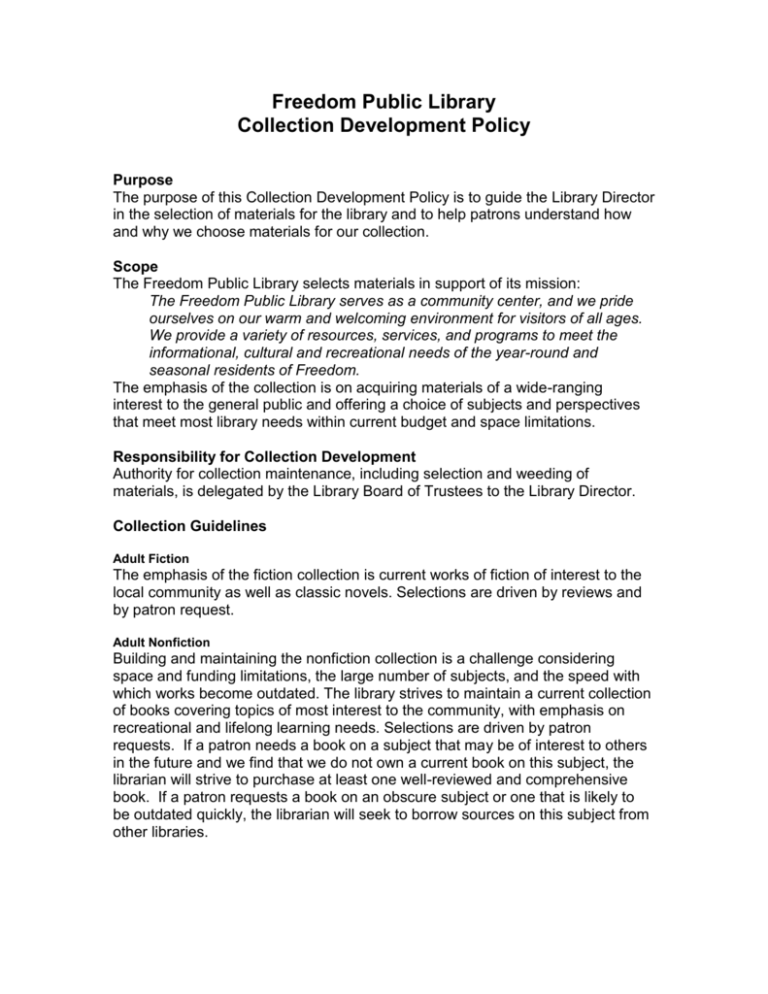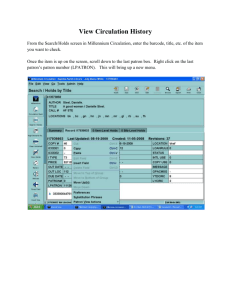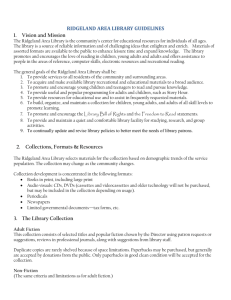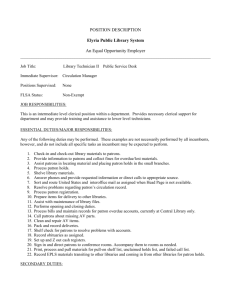Collection Development Policy
advertisement

Freedom Public Library Collection Development Policy Purpose The purpose of this Collection Development Policy is to guide the Library Director in the selection of materials for the library and to help patrons understand how and why we choose materials for our collection. Scope The Freedom Public Library selects materials in support of its mission: The Freedom Public Library serves as a community center, and we pride ourselves on our warm and welcoming environment for visitors of all ages. We provide a variety of resources, services, and programs to meet the informational, cultural and recreational needs of the year-round and seasonal residents of Freedom. The emphasis of the collection is on acquiring materials of a wide-ranging interest to the general public and offering a choice of subjects and perspectives that meet most library needs within current budget and space limitations. Responsibility for Collection Development Authority for collection maintenance, including selection and weeding of materials, is delegated by the Library Board of Trustees to the Library Director. Collection Guidelines Adult Fiction The emphasis of the fiction collection is current works of fiction of interest to the local community as well as classic novels. Selections are driven by reviews and by patron request. Adult Nonfiction Building and maintaining the nonfiction collection is a challenge considering space and funding limitations, the large number of subjects, and the speed with which works become outdated. The library strives to maintain a current collection of books covering topics of most interest to the community, with emphasis on recreational and lifelong learning needs. Selections are driven by patron requests. If a patron needs a book on a subject that may be of interest to others in the future and we find that we do not own a current book on this subject, the librarian will strive to purchase at least one well-reviewed and comprehensive book. If a patron requests a book on an obscure subject or one that is likely to be outdated quickly, the librarian will seek to borrow sources on this subject from other libraries. The library builds collections that happen to be of current interest to the community, such as autism, gardening, knitting, and homestead farming. As interest in these subjects wanes, titles may be weeded. Due to the large number of destinations in the world and the speed with which these titles become outdated, the library does not purchase travel books unless there is an immediate need that cannot be satisfied by interlibrary loan. Audiobooks Because not all patrons are able to or interested in using the library’s free downloadable audio service, the library continues to purchase some titles on CD. The library’s participation in the Bear Camp Library Co-op and interlibrary loan help meet the needs of audiobook users. Books on cassette are being phased out and are no longer added to the collection. DVDs A large percentage of the library’s circulation is of video titles. The library strives to maintain a collection of movies that have been well-reviewed and are of interest to the local community. The library’s participation in the Bear Camp Library Co-op, the library’s Netflix membership and interlibrary loan also help meet the needs of patrons. VHS tapes are being phased out and are no longer added to the collection. Periodicals The library subscribes to magazines of current interest to the community and generally keeps no more than one year of back issues. Children’s Picture Books The library strives to add new titles regularly to keep the collection fresh and vibrant. Older titles are weeded if they become unattractive or are no longer circulating. Juvenile Fiction The emphasis of the juvenile fiction collection is newer titles of current interest. Classics are kept if they are circulating and not just because they are classics. Selections are driven by reviews, by the librarian’s knowledge of what is popular, by patron request, and by the curriculum needs of Freedom students. Juvenile Nonfiction The emphasis of the juvenile nonfiction collection is on titles that meet the recreational interests and curriculum needs of Freedom students. The library builds collections that happen to be of current interest, such as books on animals, knitting, transportation and dinosaurs. As interest in these subjects wanes, titles may be weeded. Reference Given the availability of electronic sources of information, the library does not try to maintain a comprehensive reference section. Selection Criteria Selection of materials is based upon the community’s current needs and interests and anticipated future use. Materials are evaluated as complete works and not on the basis of a particular passage or passages. A work will not be excluded from the library’s collection solely because it represents a particular aspect of life, because of frankness of expression, or because it is controversial. The selection of material is not meant to express or imply an endorsement of the author’s work or viewpoint. Although library materials are arranged for age appropriateness, any library user may use any materials. Parents or guardians are responsible for guiding the selections of minor children, not the Librarian, library staff, library volunteers, or the Board of Trustees. The selection of materials for the library is not restricted by the possibility that minor children may obtain materials their parents or legal guardians may consider inappropriate. All acquisitions, whether purchased or donated, are evaluated by the following standards and in accordance with guidelines stated by the American Library Association in its Library Bill of Rights, Freedom to Read and Freedom to View statements. An item need not meet all the criteria to be acceptable, nor will any single criterion be decisive. Selection may be based upon (in no particular order of importance): Excellence of reputation of the work The reputation and/or significance of the author, publisher or producer. Opinion of critics and reviewers Accuracy and timeliness Literary merit How quickly the work will become out of date Appeal and relevance to community interests and needs Popularity with library users Format suitable for library use Suggestions by library users Price and availability of funds Relationship to other items in the collection The material’s ability to support the SAU 9 and SAU 13 curricula The author, illustrator, or subject residing locally Lack of sufficient and current materials available on the same subject Space Accessibility through interlibrary loan Material Classifications The library’s materials may include books, audio books, videos and DVDs, periodicals, reference books, software, electronic databases, electronic books, puzzles, games, and equipment. Patron Requests The library welcomes suggestions from users for the purchase of new library materials. All requests are evaluated in accordance with the Collection Development Policy and with consideration of need, space, and availability of funds. Multiple Copies The library will occasionally purchase multiple copies of titles that have or are anticipated to have high public demand when deemed appropriate and budget permits. Additional copies will be weeded when demand wanes. Memorial Gifts and Donations Gifts from the public are welcome and encouraged, however the materials donated are subject to the same policies that govern the selection of new materials. The Library Director is authorized to accept books and other materials only if there are no conditions attached and to sell or otherwise dispose of donations not added to the collection. Donors may ask for a letter acknowledging the donation. However, the donor, not library staff, must determine the value of the gift. Donors may request that a gift be purchased from within a subject area, but title selections will be made by the Library Director in accordance with the Collection Development Policy and based on need. Memorial gifts and other donations will be evaluated as part of the library collection, and may be withdrawn if at some point deemed appropriate according to the library’s weeding guidelines. Interlibrary Loan Items not held in the library’s collection because they are beyond its scope or because of limited budget and space may be available to library patrons through Interlibrary Loan. Only library users in good standing may request material from another library. If the item is unavailable in New Hampshire, the requesting library user may request the library to perform an out-of-state search. Borrowing fees required by out-of-state or private libraries will be the responsibility of the patron. If the request is for material that has recently been published and the Library Director determines that the title will not be purchased for the collection, the patron may have to wait up to six months for the library to be able to request the title from another library. Withdrawal of Library Materials The library is limited in the size of the collection it can maintain. In order to keep the collection current and to be of greatest usefulness to its patrons, it will be necessary to discard materials that are deemed no longer of value to the collection. The Library Director will withdraw items from circulation following accepted professional weeding guidelines. Materials may be withdrawn if they are worn, obsolete, or out of date, if they are little used, if a new edition has been purchased, if multiple copies are no longer needed, or to make room for more materials. The library does not attempt to preserve old editions except in rare cases when an item is deemed to be of local interest. Materials removed from circulation may be placed in storage, donated to another institution, sold, discarded, or given away. Reconsideration of Materials The Freedom Public Library is committed to supporting intellectual freedom, providing access to diverse viewpoints, and protecting the privacy of library users. The Board of Trustees endorses the Library Bill of Rights, the Freedom to Read Statement and the Freedom to View Statement. Materials selected under the Collection Development Policy are considered protected under the First Amendment of the United States Constitution. The Board of Trustees believes that anyone is free to reject for himself/herself library materials of which he or she does not approve, however, the individual cannot restrict the freedom of others to read, view, or hear. The Board of Trustees recognizes the right of individuals to question materials in the library collection. Whenever a patron objects to the presence or absence of any library material, the complainant will be given hearing and consideration. All complaints to staff members and volunteers will be referred to the Library Director who will discuss the matter with the complainant. If not satisfied, the patron will be given a Request for Reconsideration of Library Materials form to complete as well as copies of this Collection Development Policy, the Library Bill of Rights, the Freedom to Read Statement and the Freedom to View Statement. An integral part of the library’s Collection Development Policy is that materials are evaluated as complete works and not on the basis of a particular passage or passages. Therefore, only those requests in which the patron has read/listened to/viewed the entire work will be considered. The completed form will be given to the Library Director, who will consider whether the material meets the selection criteria outlined in this policy. A decision will be made regarding whether or not to add or withdraw the material within a reasonable amount of time, with the philosophy and criteria used to be explained in writing to the patron. If the patron is dissatisfied with the decision, he or she may appeal to the Board of Trustees, which will review the request at their next regularly scheduled board meeting. Patrons are welcome to express their concerns directly to the Board of Trustees at this time. The Board of Trustees will then vote on the request based on whether the questioned material is compliant with this Collection Development Policy and whether to add or withdraw the material in question. The Board of Trustees will notify the requesting patron within ten days after such board meeting of their final decision. Accepted by the Library Trustees - May 12, 2011





